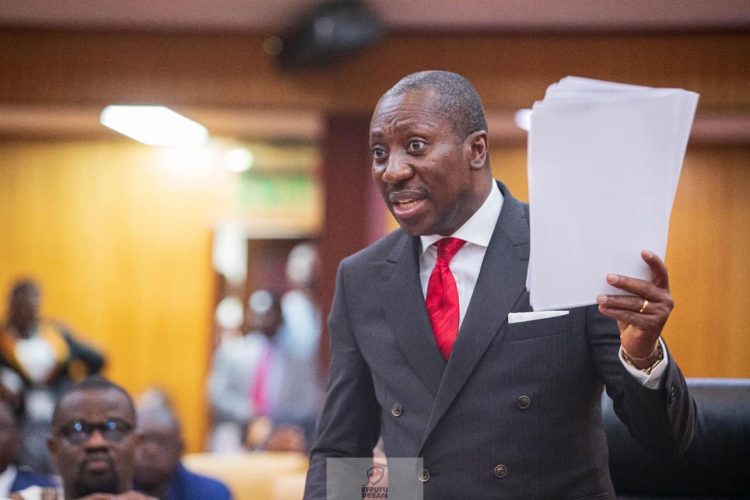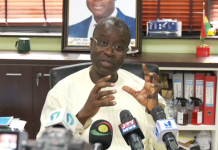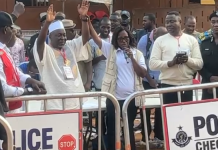Alexander Afenyo-Markin, the Majority Leader in Ghana’s Parliament, has filed an urgent legal action with the Supreme Court in response to opposition threats to force several Majority caucus MPs to vacate their seats, potentially disrupting the parliamentary balance just months before a pivotal general election.

The legal filing, submitted to the Supreme Court on Tuesday, October 15, seeks clarification on the status of three MPs whose decisions to run as both NPP and independent candidates in the upcoming December 2024 elections have ignited a constitutional debate.
Afenyo-Markin’s move aims to counter the opposition’s plan to invoke Article 97(1)(g) of the constitution, which could see these MPs lose their seats.
This follows an October 13, 2024, statement by former Minority Leader Haruna Iddrisu, who announced the opposition’s intent to compel ruling party MPs contesting as independents to step down, citing Article 97(1)(g) of the constitution.
This article states: “A member of Parliament shall vacate his seat if he leaves the party of which he was a member at the time of his election to Parliament to join another party or seeks to remain in Parliament as an independent member.”
The three MPs central to the case are:
- Cynthia Morrison, NPP MP for Agona West, who has filed to run as an independent.
- Kwadwo Asante, NPP MP for Suhum, also running as an independent.
- Andrew Asiamah Amoako, independent MP for Fomena, who now seeks to run on the NPP ticket.
Afenyo-Markin argues that these MPs’ decisions, which concern their future candidacies, should not affect their current standing in the 8th Parliament.
The case has significant implications. If the MPs are deemed to have vacated their seats, the NPP would lose its slim majority, potentially stalling government business ahead of the December elections.
Afenyo-Markin’s filing notes that by-elections are prohibited within three months of a general election, meaning a strict interpretation of Article 97 could see the ruling party’s numbers drop from 138 to 135, while the opposition remains at 137—giving them a temporary majority in the final months of the parliament.
Additionally, Afenyo-Markin has sought an interlocutory injunction to prevent the Speaker of Parliament from making any rulings on the MPs’ status until the court provides its verdict, warning that premature decisions could cause “irreparable damage” to the MPs involved.
This case highlights the complexities of Ghana’s constitutional framework and the tension between personal political ambitions and party loyalty.
It also recalls a similar situation in November 2020, when then-Speaker Mike Ocquaye declared the Fomena seat vacant after Andrew Amoako Asiamah ran as an independent candidate.
However, Afenyo-Markin’s legal approach seeks to distinguish the current case, setting the stage for a landmark ruling on Article 97(1)(g).
























































![[FREE FREE MONEY] Predict and Win a Guaranteed GH¢200 From Us EVERY WEEK](https://wordpress.ghanatalksradio.com/wp-content/uploads/2022/02/Predict-and-Win-Final-09-03-2021-218x150.jpg)
![[Predict & Win – 8th/Oct.] WIN A Guaranteed ¢200 From Us This Week](https://wordpress.ghanatalksradio.com/wp-content/uploads/2021/10/maxresdefault-16-218x150.jpg)
![[Predict & Win – 2nd] WIN A Guaranteed ¢200 From Us This Week](https://wordpress.ghanatalksradio.com/wp-content/uploads/2021/09/maxresdefault-50-218x150.jpg)
![[Predict & Win – 25th] WIN A Guaranteed ¢200 From Us This Week](https://wordpress.ghanatalksradio.com/wp-content/uploads/2021/09/maxresdefault-36-218x150.jpg)
![[Predict & Win – 18th] WIN A Guaranteed ¢200 From Us This Week](https://wordpress.ghanatalksradio.com/wp-content/uploads/2021/09/maxresdefault-23-218x150.jpg)









![[National cathedral] See full list of churches that have contributed since 2018](https://wordpress.ghanatalksradio.com/wp-content/uploads/2020/09/Ghana-National-Cathedral-GhanaTalksRadio-100x70.jpg)



